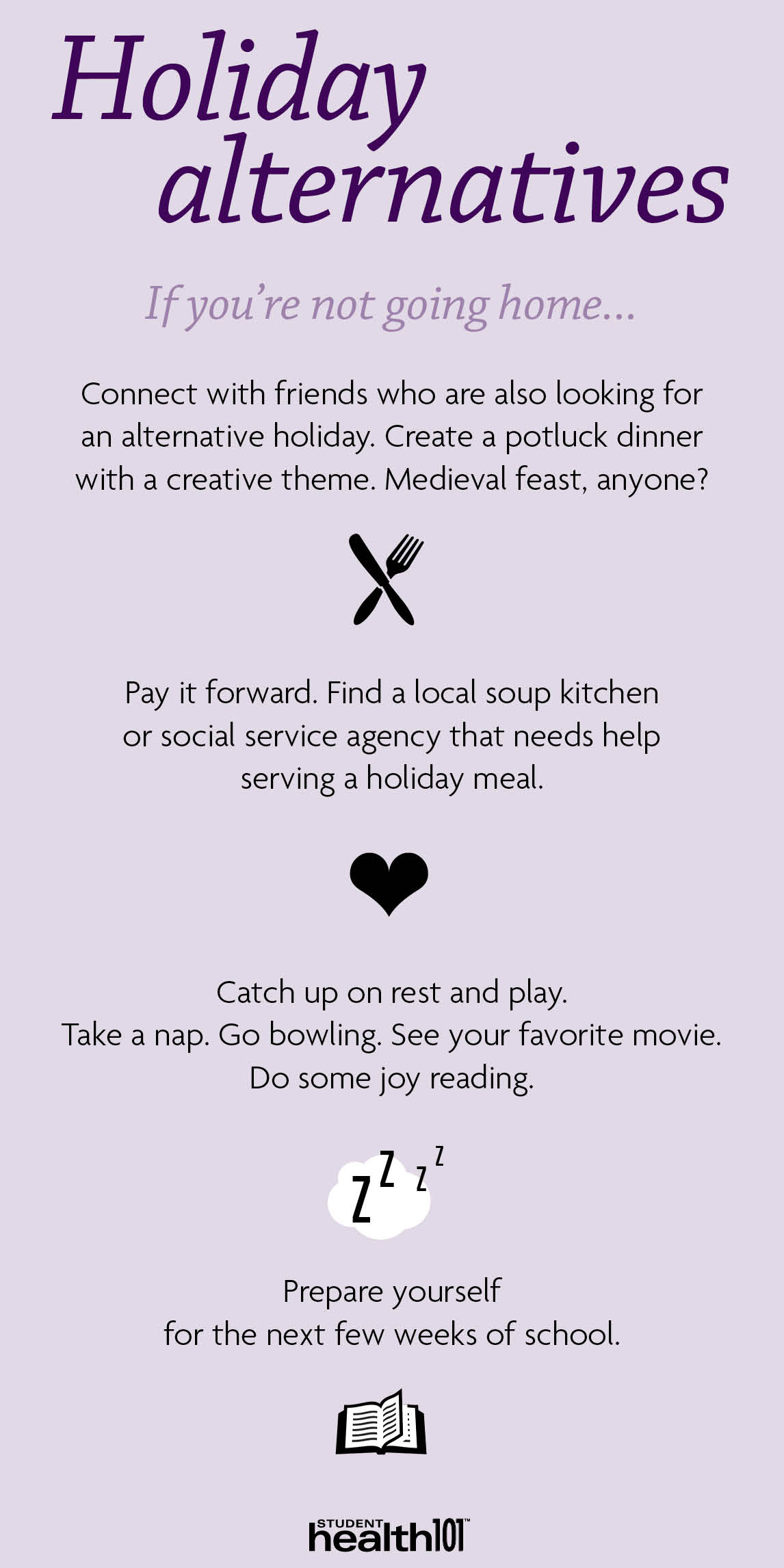What is home isn’t home?
Finding your place during the holidays
 |
Your first trip home for the holidays comes just 12 weeks after you started the academic year—but those 12 weeks have been packed with intense experiences. Going home, family dynamics are unlikely to feel quite the same, especially if your family has relocated or lost or added members.
studentvoice

Counselor perspective
Peter Welch MA teaches at the University of New Hampshire and is a former wellness educator and counselor
When students go home for the holidays, what stays the same, and what’s different? If you’re going home, chances are this will be your first reunion with your family since the beginning of the school year. Holidays often come with high expectations. Are you confident you know how it will all go down—or anticipating surprises?
You’ve changed
Though it’s only been three months, your time in school has likely been intense. I’m often amazed at the dramatic changes I see in students in this period. They become more confident and self-assured. They are more curious to understand themselves and others. They challenge their own beliefs and identities.
Maybe they’ve gone vegetarian (“No thank-you on the turkey”). Maybe they’ve decided to follow their passion (“I'm changing my major to art history”), or realized they want to travel before they settle into a job (“I've always wanted to see New Zealand”).
Your folks have changed too
While you've been away at college, your family has evolved too. They’ve adapted to life without you there. Although your Thanksgiving table might feature the same old people, they’re not quite the same old people. Being conscious of these adjustments can be helpful. You might notice new behaviors, habits, and ways of being in the world—and your family might see these in you as well.
When your parents mentioned that there had been “changes” since you were last at home, maybe you didn't expect to see your bedroom turned into an exercise room. Ouch!
Are we okay?
The holidays also bring their own set of challenges, expectations, and opportunities. Many families have specific holiday rituals, often revolving around food and how time is spent together. These occasions can be joyful, but they’re notorious too for generating stress.
Talk with each other and come up with agreements that recognize and respect both your burgeoning independence and your parents’ way of life.
Practice compassion
Accept yourself and your family members as they are. Try to be aware of ways that you’re dealing with holiday stress. This will involve a certain level of self-compassion, and compassion for others.

Before going home for the holidays, ask yourself…
- What are your own holiday expectations? Are you able to feel okay if some of your expectations aren’t met?
- What are the pros and cons of engaging in certain holiday activities?
- Are specific holiday traditions non-negotiable? If so, which ones and why?
- What’s the best thing that could happen if you did or didn’t do something that relates to your holiday traditions?
- What tensions do you anticipate? Advance mental prepping can make them easier to handle in the moment.
Student perspective
Shifting perspective
“I seemed to be clashing a lot more with my strong-willed dad than before. I was eager to put forward my own opinion and have a discussion rather than just accepting something.”
Syed A., University of Alberta, Edmonton, Canada
“Lack of higher education makes my mother’s family seem petty and highlights their flawed understandings of things. Most of my dad's family is university-educated so I don't experience quite the same thing with them.”
Sara S., University of Saskatchewan, Saskatoon, Canada
Transitional tensions
“At first I felt like I had a lot more freedom, but my parents still expected me to be checking in with them. However, it has gotten easier as the years have gone on and I’ve been able to communicate more effectively.”
Gretchen N., Western Oregon University in Monmouth
I like my family more
“I found a new perspective on the importance of family. When you are distanced for a long time you feel a sense of longing.”
Mark P., Hudson Valley Community College, Troy, New York
"A lot less fighting and more laughter.”
Sarah M., University of Regina, Saskatchewan, Canada
"The festivities were the same, but seeing family meant a lot more. In years prior I would have felt like some family gatherings were a boring obligation."
Zane W., Northern Michigan University, Marquette
My people had scattered
“When I went home for Christmas it was different since it was the first year my parents were living separately. It was uncomfortable to budget time to see both of them.”
Kelsey W., Johns Hopkins University in Baltimore, Maryland
“Most of my friends have scattered all around and aren’t actually home, and it's a bit depressing to think that we've grown apart just because the physical distance between us has.”
Kristen C., University of Waterloo, Ontario, Canada
Familiar holiday rituals
“Same company, same food, same behaviors, and always someone gets upset from trying to have an adult discussion with a certain uncle.”
Emily F., Ohlone College in Fremont, California
“I love our family traditions. But the thing I love most is how well we all still get along so easily, as if we still live all under one roof."
Michael C., Clemson University, South Carolina
Trading families
“I come from Vietnam. I had the opportunity to join Thanksgiving with an American family I know. It was fun engaging in another nation’s culture.”
Jeremy D., Trinity College in Hartford, Connecticut
“I have been celebrating Thanksgiving with my best friend’s family, because it’s too expensive to fly home for such a short time.”
Patricia C., University of Wyoming, Laramie
And if you don’t go home
For some students, alternative holiday experiences are important for their own self-care.
Small is beautiful
“I usually make a small dinner for myself, my boyfriend, and my roommate who doesn’t go home either.”
Mandy W., Lakehead University, Thunder Bay, Ontario, Canada
IF YOU’RE NOT GOING HOME, CONSIDER THESE ALTERNATIVES
- Connect with friends who are also looking for an alternative holiday. Create a potluck dinner with a fun and creative theme.
- Find a local soup kitchen or social service agency that needs extra help serving a holiday meal, or other volunteer opportunities within your community.
- Use the time to catch up on rest and play. Take a nap. Go bowling. See your favorite movie. Do some joy reading.
- Prepare yourself for the next few weeks of school.
studentvoice






